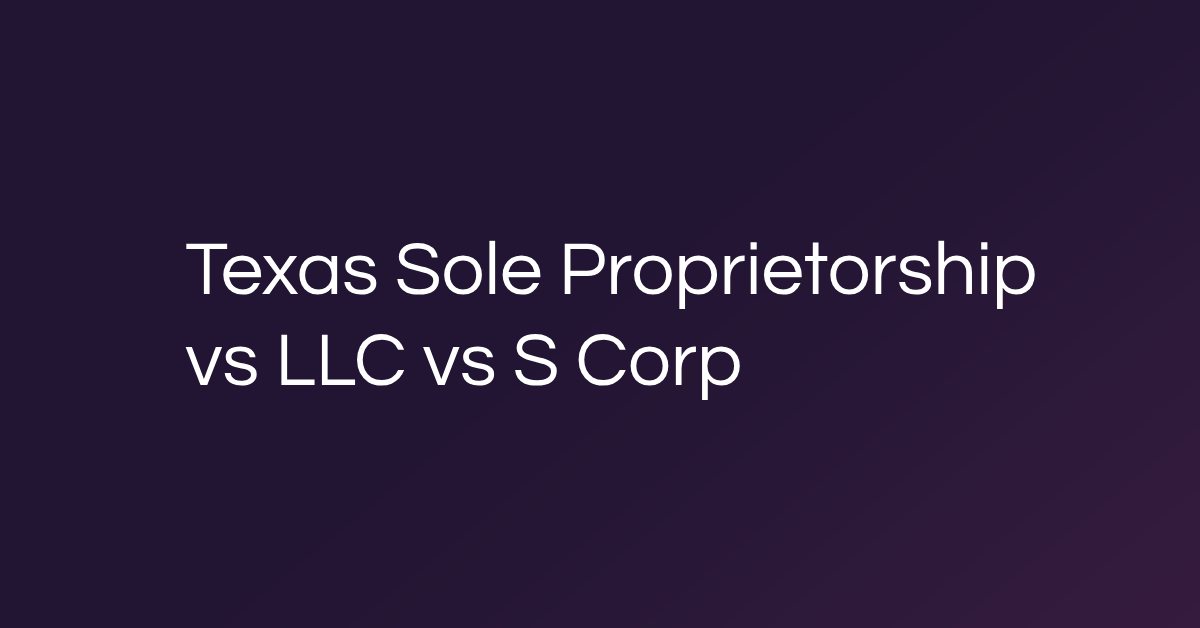For Texans eager to leave the nine-to-five grind, choosing the right business structure is pivotal. Many new solopreneurs begin as sole proprietors because this structure requires little paperwork and no formal registration. While a sole proprietorship business structure in Texas offers simplicity, it also means Texas solopreneurs are personally responsible for business obligations.
For Texas business owners looking to protect their finances, structuring as an LLC or an S corporation (S corp) provides better liability protection, additional tax advantages, and more credibility with clients and investors. Understanding how a Texas sole proprietorship compares to these alternatives will help solopreneurs like yourself build a business that supports long-term success in the Lone Star State.
What is a Texas sole proprietorship?
A sole proprietorship in Texas is the most basic way to start a business. It allows a business owner to operate without forming a separate legal entity, meaning all profits, debts, and liabilities are tied directly to the individual.
This is one of the most common Texas business structures, and it appeals to new solopreneurs because it requires minimal paperwork and no formal state registration beyond obtaining any necessary business licenses or permits. Because there’s no legal separation between the business and the owner, tax filing is straightforward—business income is reported on a personal tax return.
While a Texas sole proprietorship is easy to establish, it does not provide liability protection. Solopreneurs seeking to limit personal financial exposure often explore options like forming an LLC.
Pros of sole proprietorship in Texas
Many solopreneurs start with a sole proprietorship because of its simplicity and flexibility. This structure allows business owners to operate independently without extensive legal requirements.
- Fast and inexpensive setup: a sole proprietorship does not require formal state registration, which reduces paperwork and startup costs.
- Fewer compliance requirements: Texas has business-friendly policies, making it easier for sole proprietors to handle regulatory obligations.
- No state income tax: Texas does not impose a state income tax on self-employed individuals, allowing business owners to keep more of their earnings.
While these advantages make sole proprietorships attractive, they also come with limitations. Solopreneurs should weigh their long-term goals when choosing the best business structure in Texas.
Cons of sole proprietorship in Texas
While a sole proprietorship offers simplicity, it also comes with significant drawbacks that can limit business growth and financial security.
- No legal distinction between business and owner: sole proprietors are personally responsible for all business debts and legal claims, which puts their personal assets at risk.
- Limited access to funding: banks and investors typically prefer structured business entities, making it harder for sole proprietors to secure loans or attract investors.
- Scaling challenges: as a business grows, handling financial and legal responsibilities alone can become overwhelming.
The disadvantages of sole proprietorship often prompt solopreneurs to explore alternatives like an LLC for better liability protection and financial flexibility.
Why consider a Texas LLC instead?
Forming an LLC offers stronger legal and financial protections than a sole proprietorship.
- Limits personal financial risk: Unlike sole proprietors, LLC owners are not personally responsible for business debts or lawsuits.
- Tax flexibility: LLCs allow for pass-through taxation, similar to sole proprietorships, but also provide the option to elect S-corp status for potential tax savings.
- More business credibility: Many clients, lenders, and investors prefer to work with LLCs over sole proprietors due to their structured framework.
Texas offers specific LLC formation benefits that make this business structure even more appealing to solopreneurs.
Texas-specific considerations for LLCs
Texas provides a business-friendly environment for LLC owners, offering several advantages that make this structure appealing.
- No state income tax: Texas does not impose a personal income tax, allowing LLC owners to benefit from pass-through taxation without an additional state tax burden.
- Low filing and compliance costs: While Texas LLCs must file a Certificate of Formation, ongoing maintenance costs are relatively low compared to other states.
- Flexible management structure: LLCs in Texas can be managed by members or appointed managers, offering options for different business needs.
Solopreneurs must follow the Texas LLC registration guidelines to ensure compliance with state regulations.
Transitioning from a Texas sole proprietorship to an LLC
Switching your business structure to an LLC or other structures offers increased legal protection, tax flexibility, and opportunities for business growth. An LLC establishes a legal distinction between the owner and the business, reducing personal exposure.
If you’re planning on moving from a sole proprietorship in Texas to an LLC, you’ll need to:
- Choose a business name: The name must be unique and comply with Texas naming requirements. Conduct a business entity search through the Texas Secretary of State to check availability.
- File a Certificate of Formation: Submit Form 205 to the Texas Secretary of State and pay the required filing fee to establish the LLC.
- Create an operating agreement: While not required by Texas law, this document outlines ownership, management responsibilities, and business operations.
- Obtain an EIN: Secure a new Employer Identification Number (EIN) from the IRS for tax purposes, even if the sole proprietorship already had one.
- Update business licenses and permits: To comply with licensing requirements, notify state and local agencies of the business structure change.
Making the transition strengthens liability protection and positions the business for sustainable growth. Besolo simplifies the process, helping solopreneurs navigate LLC formation seamlessly and then providing all the tools needed to run the business.
Additional business strategies for Texas solopreneurs
Solopreneurs should take proactive steps to manage finances, streamline operations, and leverage available resources to scale efficiently:
- Separate personal and business finances: Open a dedicated business bank account and use accounting software to track income and expenses. This simplifies tax reporting and financial planning.
- Understand Texas state tax obligations: Texas does not impose a personal income tax, but LLCs may be subject to the Texas franchise tax depending on revenue. Proper tax planning helps optimize profitability.
- Leverage local business resources: Solopreneurs can access mentorship, funding opportunities, and networking events through organizations like the Texas Economic Development Division and the Small Business Development Centers (SBDCs).
- Develop a strong business plan: Having a clear roadmap for growth improves decision-making and increases the likelihood of securing financing from investors or lenders (if needed).
Taking advantage of these strategies can position a business for long-term success. The Besolo blog offers more expert insights and additional solopreneurial tips for planning your future.
Build a business that lasts
Sole proprietorships offer simplicity, but they also leave your personal assets exposed and limit growth potential. Structuring as an LLC provides liability protection, tax flexibility, and greater credibility—key factors in building a sustainable business.
Besolo streamlines LLC formation, making it easier for Texas solopreneurs to take the next step. Become a member today and start building your future.








